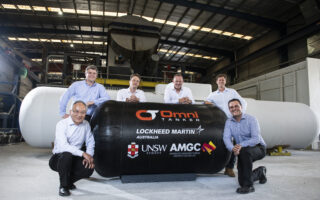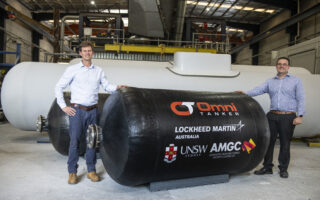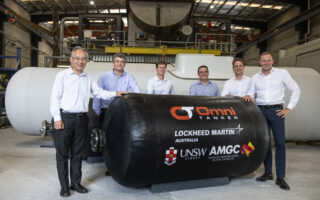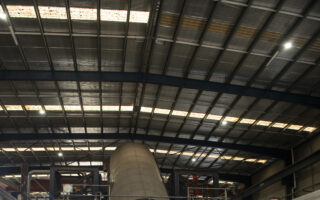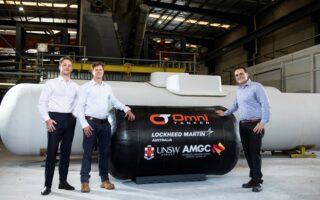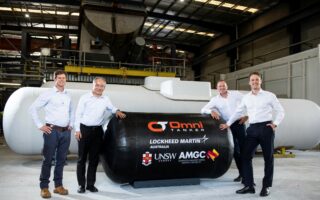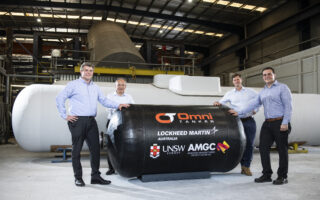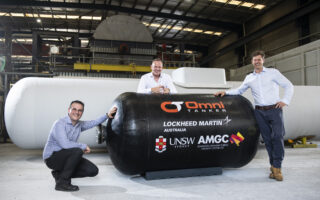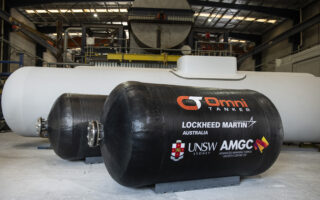Australian manufacturer delivers world-leading liquid hydrogen storage project with Lockheed Martin
Two years in the making, Australian composites manufacturer Omni Tanker in collaboration with international aerospace giant Lockheed Martin and the University of New South Wales (UNSW) has developed a world-leading solution for the transport of cryogenic and liquid cargoes of hydrogen and helium, with support from the Advanced Manufacturing Growth Centre (AMGC).
The collaborative partnership builds upon Omni Tanker’s expansive composite capabilities developed for use across its industrial transport portfolio. The company currently leads global manufacturing in lightweight, composite road tankers for caustic materials that are used and sold locally and exported to Europe, and North America from its Sydney base.
Pairing Omni Tanker’s capabilities with Lockheed Martin’s extensive aerospace experience led to the development and manufacture of two new tanks including a:
- Type 4, fluoropolymer-lined, carbon fibre composite tank, and a
- Type 5, liner-less, carbon fibre composite tank.
The tanks can store and transport liquid hydrogen, as well as oxygen, hydrogen peroxide, and hydrazine at high pressures under extreme cryogenic temperatures.
In testing, the tanks achieved their performance metrics, particularly when materials were exposed to cryogenic temperatures as low as minus 269 degrees Celsius. As a result of the successful project, operational-scale demonstrator versions of the tanks for Lockheed Martin’s LM2100 satellite have now been manufactured at Omni Tanker’s advanced manufacturing facility located in Sydney’s west.
Omni Tanker CEO and Founder Dr Daniel Rodgers said the $1.59 million project has taken the company’s world-leading capabilities to new heights.
“By leveraging Omni Tanker’s capabilities, we have been able to translate our composite road tanker technology to the global space sector – where performance, weight, and cost are of paramount importance”, said Rodgers.
“Omni Tanker can develop and deliver composite pressure vessels to meet demanding technical requirements quicker and at a lower cost than exotic materials, such as titanium, which are widely used in the space sector.” Rodgers said.
Christopher Hess, Lockheed Martin Australia’s Head of Industrial Development said, “The global strategic environment is constantly evolving, and Lockheed Martin is committed to working with industry, through exemplary partners such as Omni Tanker, UNSW, and AMGC, to deliver a world-leading space capability.”
Dr Jens Goennemann, Managing Director of AMGC, said the project demonstrates the importance for manufacturers to look beyond their current businesses.
“With the assistance of AMGC, Omni Tanker has done what more manufacturers should do: seek ways to leverage their capabilities across adjacent opportunities, in this case moving from road tankers to spacecraft”, said Goennemann. It’s generally not rocket science – except in this case it is.” Said Goennemann.
Together, the project participants identified a new application for Omni Tanker’s patented OmniBIND solution which links an interior thermoplastic tank to a lightweight composite exterior tank. The use of a nanoengineered additive product, developed by a UNSW, prevented matrix cracks usually present at extremely low temperatures in pressure vessels storing liquefied hydrogen.
UNSW’s Scientia Professor Chun Wang explains, “The collaborative efforts with Omni Tanker and Lockheed Martin Space have been pivotal in transforming this cutting-edge technology into practical commercial applications”, said Professor Wang.
“As a result of extensive nano-engineering efforts, we now have composite structures that can withstand the extreme cold of liquid hydrogen without experiencing microcracking or hydrogen gas leak.” said Professor Wang.
Dr Luke Djukic, CTO at Omni Tanker, said the project represented a significant step forward for the company and a strategic leap in sovereign capability.
“These new material technologies are well-matched to the high-end pre-impregnated composite materials typically used in aerospace yet offer a more economical production method from materials that are readily available,” said Djukic.
“In developing these new products and processes onshore, we have established significant sovereign capability at Omni Tanker. We look forward to leveraging this capability as we move our tanks into operational use across the transport and aerospace sectors here and abroad.” said Djukic.
The co-funded project worth a total $1.59 million, received co-investment from the Advanced Manufacturing Growth Centre to the value of $700,000, while in-kind contributions totalled $194,000. Further information regarding the project is available via www.amgc.org.au/project/development-of-type-iv-and-type-v-carbon-fibre-reinforced-polymer-tanks/

